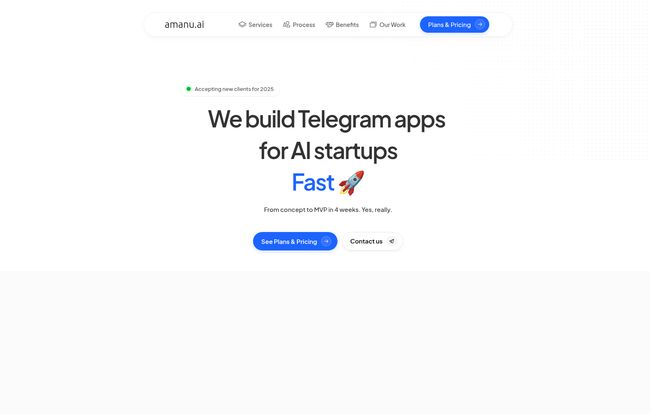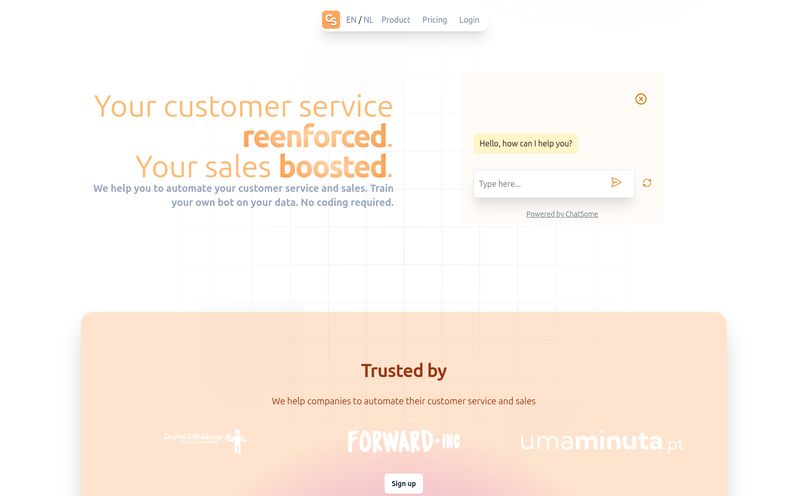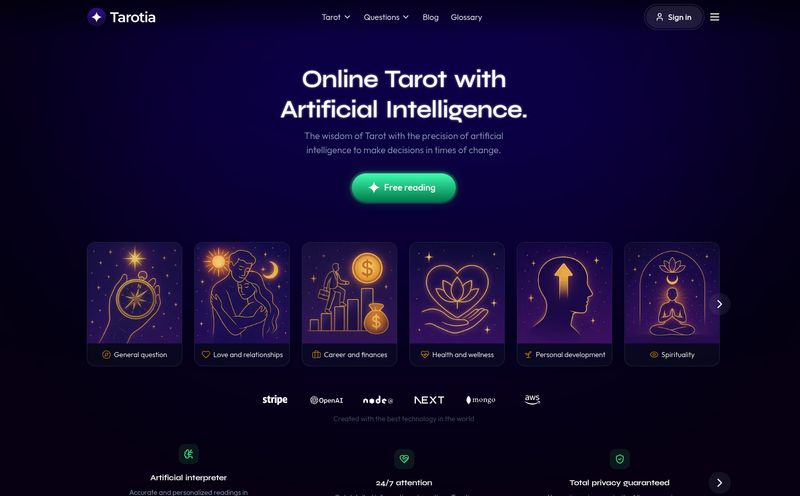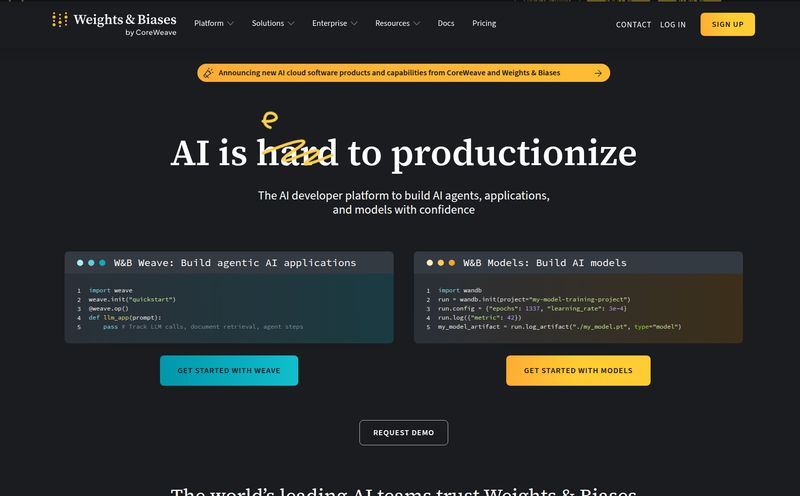Launching an AI startup is organized chaos. You're juggling model training, fundraising pitches, and trying to figure out if your 'revolutionary' idea is something people will actually use. The pressure to get a Minimum Viable Product (MVP) out the door is immense. It's like trying to build a plane while it's already in freefall, and someone's yelling about the color of the seat cushions.
For years, the playbook was simple: build a web app, maybe a clunky mobile app, and then burn your marketing budget begging for attention. But what if the audience isn't there anymore? What if they're somewhere else, somewhere more direct and... conversational? I'm talking about Telegram. And that's where I stumbled upon a curious little company called Amanu.ai.
Their headline is bold. Almost arrogant.
We build Telegram apps for AI startups. Fast.
Followed by a claim that makes any seasoned project manager spit out their coffee: "From concept to MVP in 4 weeks. Yes, really." My first thought? Yeah, right. But then I looked closer, and I have to admit, I'm intrigued.
So, What's the Deal with Amanu?
At its core, Amanu isn't just another dev shop you'd find on Upwork. They're a specialized launchpad. They have one mission: to build and launch Telegram-based applications—think sophisticated chatbots and slick Mini Apps—specifically for AI companies. They're not trying to be everything to everyone. They're a precision tool, not a Swiss Army knife. This focus is their first big green flag for me. In a world of generalists, specialists get things done right.
They handle the full-stack development, the AI infrastructure integration, and the entire process to get your product live inside the Telegram ecosystem. It's a guided journey, designed to bypass the usual months of development hell and get you in front of real users, fast.
The Allure of Building on Telegram
Okay, why Telegram? Why not just build a website? I've seen this debate play out in marketing Slack channels and founder forums for a while now. Some old-school folks just don't get it. But the smart money is paying attention. Telegram isn’t just a messaging app anymore; it’s morphing into the West's answer to WeChat, a “super app.”
You have a built-in user base of nearly a billion people. The friction to get a user is practically zero. They don't need to visit an app store, wait for a download, and go through a clunky signup process. They just... start talking to your bot. Or open your Mini App right within a chat. The potential for viral loops and direct user engagement is off the charts. It's a distribution channel and a product platform rolled into one. For an AI startup that thrives on interaction and data, it’s a goldmine.
Amanu's Four-Week Sprint from Idea to Reality
This is the part that sounds like a marketing gimmick, but seems to be their entire business model. Four weeks. I've managed dev projects that took six months just to agree on the SOW (Statement of Work). How do they possibly pull this off?
From what I can gather, their process is hyper-focused. It starts with a discovery phase (included in the timeline, which is key) to nail down the concept. Then, it's a full-on sprint. They’re not building a bloated, feature-creeped monstrosity. They’re building an MVP. The goal is to get a functional, core version of your product into the hands of users to start learning. Speed to market is the name of the game, and this is the entire playbook.

Visit Amanu
What's Inside the Box? The Amanu Service Breakdown
When you sign on with them, it's not just a block of coding hours. It's a full-service package. Let's break it down.
Full-Stack Development on a Silver Platter
This is the whole shebang. The Telegram Bot, the Mini App, and even the AI infrastructure setup. They're your outsourced tech team. But here's the kicker, and for me, this is maybe the most important part: you get full control and ownership of the code and infrastructure. This isn't a SaaS platform where you're trapped in their ecosystem. They build it, hand you the keys, and you own the car. No vendor lock-in. That's a massive vote of confidence in their own work.
The Communication Cadence
They promise daily updates. Daily. And a private chat with a 24-hour turnaround. One of their self-listed 'cons' is that communication is primarily in writing. Honestly? I see that as a pro. For anyone who has been stuck in endless Zoom meetings that could have been an email, this is a dream. It creates a perfect paper trail. No misinterpretations, no 'I thought you said...' moments. Just clear, documented progress.
Unlimited Revisions and Launch Support
The phrase "unlimited revisions" always raises an eyebrow. It sounds unsustainable. But in the context of a 4-week MVP sprint, it makes more sense. It's not about redesigning from scratch every week; it's about rapid iteration to get the MVP right. They're also not just going to dump a zip file on you and vanish. The package includes launch support, ensuring your app gets off the ground smoothly.
Let's Talk Money: The Refreshingly Simple Pricing
Okay, here’s where most agency proposals turn into a 12-page novel of hourly rates, retainers, and hidden fees. Amanu's approach? A single, fixed price.
Their one and only plan, cheekily named "Startup Popular (and our only plan lol)," is a $5,000 one-time fee. That's it. No recurring charges, no surprises. For that price, you're getting a dedicated team and a live product in about a month. For any founder who has stared at a quote for $50k+ for a basic app, this should feel like a breath of fresh air.
| Plan Name | Price | What's Included |
|---|---|---|
| Startup Popular | $5,000 (Onetime) | Telegram Bot & Mini App, 4-Week Delivery, Daily Updates, Unlimited Revisions, Private Chat, Launch Support |
The Good, The Bad, and The Honest
No service is perfect, and I actually respect that Amanu is upfront about their limitations. It feels less like marketing and more like an honest conversation.
The good is obvious: insane speed, transparent pricing, direct access to a huge user base, and you own everything. It's a startup's dream scenario for a V1 launch.
But what about the 'cons'? They list three, and they're quite telling.
1. Accepting new clients for 2025: This isn't really a con, it's a humblebrag. It means they're in high demand. It’s like trying to get a reservation at that new restaurant everyone's talking about. It builds social proof. If you want in, you better plan ahead.
2. Written communication: As I said, for me this is a plus. It forces clarity and accountability.
3. Potential for issues: I love this. Any developer who promises a 100% bug-free process is either a liar or has never written a line of code. Acknowledging that bumps can happen—and that they manage them proactively—is a sign of maturity, not weakness.
Who Is This Really For?
So, is Amanu for everyone? Definitly not. And that's a good thing. They know their audience.
This is for the early-stage AI startup that needs to validate an idea without burning through its entire seed round. It's for the non-technical founder who has a brilliant AI concept but no way to build it. It’s for the team that understands that getting in front of users and iterating based on real feedback is more valuable than spending a year building a “perfect” product in a vacuum.
If you're a massive enterprise with layers of bureaucracy and a 12-month product roadmap, this probably isn't your jam. But if you're nimble, hungry, and believe in the power of the Telegram platform, Amanu seems like a purpose-built rocket ship.
In a world of over-promising agencies and murky development processes, Amanu’s straightforward, almost blunt approach is... well, it's different. It feels less like a service you're buying and more like a focused, short-term partnership to get you from zero to one. And in the chaotic world of startups, maybe that's exactly what's needed.
Frequently Asked Questions about Amanu
- Do I really own all the code?
- Yes. According to their offering, you get full ownership and control over the source code and the infrastructure it's hosted on. This is a major benefit compared to no-code platforms or other services where you're tied to them.
- Is the $5,000 fee really all-inclusive?
- It appears to cover the entire development process from discovery to launch support. You would still be responsible for ongoing infrastructure costs (like server hosting), but the development service itself is a one-time, fixed fee.
- What if my project is too complex for 4 weeks?
- Amanu's model is built around the MVP concept. The goal is to distill your big idea into a core, functional product that can be built in that timeframe. More complex features would likely be part of a later development phase, after the initial MVP is launched and validated.
- Why do they only build for Telegram?
- Specialization. By focusing exclusively on Telegram, they can be experts in its ecosystem, APIs, and user behavior. This allows them to build faster and more effectively than a generalist agency that has to learn the nuances of a new platform for every project.
- How do I get started if they're booked out so far in advance?
- Their website has a 'Contact Us' option. The best course of action would be to reach out, express your interest, and get on their waitlist for 2025. High demand is a sign of a quality service, so planning ahead is key.
- What kind of AI infrastructure support do they provide?
- While the site doesn't give granular detail, 'AI infrastructure setup' suggests they help connect your application to your chosen AI models and APIs, ensuring the backend can support the AI-powered features of your bot or Mini App.
Reference and Sources
- Amanu.ai Official Website
- Amanu Pricing Information
- TechCrunch: Telegram's Founder on Platform Growth and Monetization



